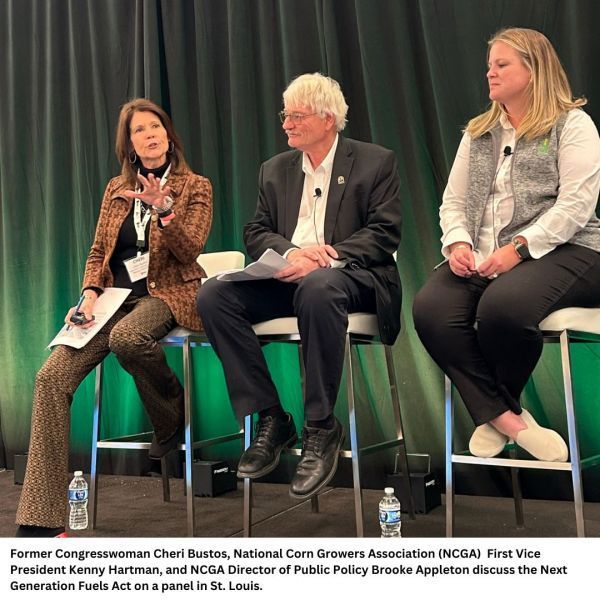Bipartisan Victory: Next Generation Fuels Act Gains Traction as a Solution Lowering Carbon Emissions Nationwide

The IL Corn Growers Association and the ethanol industry have their foot on the petal in full support of the Next Generation Fuels Act in 2024.
The bill, which sets a new clean fuel standard, was discussed by former Congresswoman Cheri Bustos, IL Corn Growers Association past president and National Corn Growers Association (NCGA) First Vice President Kenny Hartman, and NCGA Director of Public Policy Brooke Appleton on a panel at the NCGA Leadership and Action Team Meetings in St. Louis last week.
Bustos, a partner at the public strategy firm Mercury, conveyed a bright future for the bill. “I want to be very upbeat about the Next Generation Fuels Act,” she said. “Because it can happen.”
The legislation allows automakers to build cars that will utilize a more efficient and more powerful fuel, an ethanol blend that is higher in octane. The shift would lower carbon emissions nationwide and give consumers a lower price at the fuel pump.
Bustos, who originally sponsored the bill while in Congress, said the legislation has gained widespread momentum since she was in office. In September, a coalition was formed uniting members of the ethanol, automobile, and oil industries.
“We are holding hands with people we didn’t use to hold hands with on this,” she said.
In early December, ICGA joined Toyota and others in the automobile industry on another issue - the Environmental Protection Agency’s tailpipe emissions rulemaking, a de facto electric vehicle mandate.
The EPA proposal would effectively require 67% of light duty vehicles sold in 2032 to be electric. Last summer, ICGA helped submit 507 comments to the EPA docket requesting the mandate be reconsidered.
Toyota, John Deere, numerous corn grower state associations and others in the industry sent a letter petitioning Congress to defund the proposal. The document was signed by over thirty members of the Senate and over 180 members of the House of Representatives. As a result, the Consumer Vehicle Choice Act, which prohibited funding the de facto electric vehicle mandate, passed through Congress’s lower chamber.
Encouraged by opposition towards the EPA mandate, IL Corn Growers Association President Dave Rylander said the Next Generation Fuels Act fixes American fuel issues throughout the country.
“The Next Generation Fuels Act lowers our countries carbon emissions while still providing consumers and the auto industry affordability and flexibility,” he said. “Our country needs an environmental solution that includes the internal combustion engine.
Although most movements in Washington have faced roadblocks in the 118th Congress, Rylander said the bill is a win for both sides of the aisle and a message everyone can get behind. “We need the Next Generation Fuels Act. Consumers in cities need it. Farmers moving cattle need it. Automakers looking to build vehicles need it,” he said. “It is important for all of America.”







